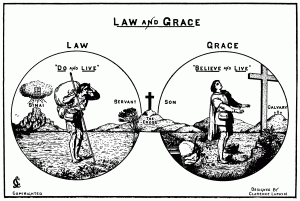Spiritual abuse is one of those labels that can be overused, much like the word cult. In the times following Jesus’ crucifixion and the birth of the Christian church, Judaism and the Roman occupiers of Jerusalem labeled the Christian movement a cult. However, it is also something that needs to be defined and exposed, because it happens in our neighborhoods, around the block, and in town.
Spiritual abuse is defined as when a spiritual leader, such as a pastor, uses his/her position of authority to control other individuals in a way that requires absolute obedience and results in the personal gain of power, prestige or financial gain.
Part 1 – Separation | Part 2 – Judgmentalism
In the book The Subtle Power of Spiritual Abuse, that author(s) talks about the recovery process necessary to put back one’s faith in God and spiritual leadership after leaving a spiritually abusive situation. Like a man or woman abused by a spouse, or a child physically abused by a parent, in time they begin to believe that this is the norm. Every other man, or women, or parent, must be like this.
Nothing could be farther from the truth, but the wounds of the heart run deeper than the skin, and the wounds of the spirit run deeper yet. God warned of false teachers that would come in, ‘not sparing the flock.’ We think that just meant teaching false doctrines, but the warnings came on the heels of Pharisees using their authority to abuse people.
I know that after I am gone, [false teachers like] ferocious wolves will come in among you, not sparing the flock; – Acts 20:29, AMP
Spiritual abuse is malicious but covert. I am even willing to admit that some abusers are ignorant of the fact that they are perpetrating abuse. Rather, they are doing it ignorantly, fully convinced that it is the right thing to do.
This is always affected by people who lead a more cult-style religious system than a grace-based, Faith focused, Christ-centered church. Rather than pointing you towards Christ and getting out of the way, these people believe that they are the only pathway to Christ, that their legislated rules and behavior models are the only acceptable way, and that you need their shepherd’s crook around your neck to stay on the straight path.
For instance, in the Oneness Pentecostal sect of Pentecostalism I was in, the leaders often believe in what is called delegated authority or spiritual fatherhood. They have the right to whip your hiney when you get out of line (figuratively). They have the right to set up curfews, and dating policies, and restrict cell phone and internet usage of congregants. They have the right to decide if you attend college, or if you seek professional help for marital or mental health issues.
As a matter of fact, in the bylaws of my old church, they taught that the pastor was the final authority on matters of infidelity – in other words, he decided if and when a divorce could take place. He even chose if and when a marriage could take place, what you could wear, sing and eat at said weddings.
Furthermore, the pastor defined our dress and clothing, what was/was not acceptable, our hairstyles, if we could have facial hair, when women had to wear nylons, and what style of underwear our daughters could wear at certain ages.
Spiritual abuse can take on many other forms, such as requiring work from church members while using guilt to enforce obedience. It can also be exhibited in the grossest forms, where spiritual leaders demand sexual relations with congregants and use their position and authority to demand silence and to instill fear.
What we know for sure, is that this is not the Kingdom or Church of Christ!
Jesus did not come to create a church in which men (and women) would lord over God’s people (1 Peter 5:3) and create rules and standards above and beyond what He already gave us. (Mark 7:7-8)
Rather, understanding and knowing that Christ came to set up a church in which humanity was inspirited to live for Him due to his love and mercy!
The adulteress of John 8 is a beautiful example of Christ combating legalism and spiritual abuse. This allows us to fulfill Scripture when we say, show me another human who is without sin, and thus is capable of passing judgment, and I’ll show you a liar. (1 John 1:8)
However, when they persisted in questioning Him, He straightened up and said, “He who is without [any] sin among you, let him be the first to throw a stone at her.” 8 Then He stooped down again and started writing on the ground. 9 They listened [to His reply], and they began to go out one by one, starting with the oldest ones, until He was left alone, with the woman [standing there before Him] in the center of the court. 10 Straightening up, Jesus said to her, “Woman, where are they? Did no one condemn you?” 11 She answered, “No one, Lord!” And Jesus said, “I do not condemn you either. Go. From now on sin no more.”] John 8:7-11, AMP
The Results of Spiritual Abuse
The most common result of spiritual abuse is causing a soul to turn away from God. This bruised and scarred spirit will take on the attitude that if that is what God is, they want nothing to do with that God.
Another result is reverse judgmentalism. This person will cast the behavior of a very bad minister upon the face of all other ministers. This is equally devastating as the judgmentalism of cult leaders and followers because it denies the one abused the right they have to recover and to see faith again.
Fear and depression is a major sign and a result of spiritual abuse. One woman recently said that she used to wake up with panic attacks in fear of God cursing her for all the wrongs she had done. When she stopped feeling that panic, she would panic again, now believing that God had given her up and she was eternally damned. Why? She was wearing jewelry, or pants, or cutting her hair.
Marital and family conflict is a very major part of the spiritual abuse and marks the organization as a cult when it demands loved ones to refuse to be part of each other lives based on the premise of believing in the organization’s set of guidelines and ideas.
Self-hate and criticism was my drug. You begin to question your own intelligence, and sanity! Some will say, ‘How could I have been so stupid!‘ or ‘Why would I be so deceived to let someone do that to me?‘ You can even start to believe it was your fault, that the responsibility was yours.
Worst of all, is that the lies of a spiritually abusive leader will be so ingrained, that even after exiting from the system, you’ll constantly wonder, ‘What if they were right, and I’m lost now?’ It can cling to you like the spray of the skunk. No matter what you try, and how many showers you take, that scent is still in your nose, always reminding you of the past.
Recovery from Spiritual Abuse
It will sound strange coming from a faith-based ministry like Divide The Word, but there are some very real and consequential steps to take in your recovery. These are by no means a complete list, and if it comes down to depression, anxiety, and marital struggles, you need to seek professional help.
Also, read the book The Subtle Power of Spiritual Abuse! You can find it here very inexpensively, and if you desperately need help buying the book, send me a private message on my contact page and I’ll help.
- Surround yourself with both secular and more loving faith-based people.
Often times, secular people can provide understanding without looking at you or your situation through the eyes of religious standards or requirements, and thus, be a very healing antidote to the poison in your heart. - Read, read, read!
Read books like Toxic Faith, Spiritual Abuse, visit websites like spiritualabuse.org and find local and even internet communities that are for the purpose of recovering from spiritual abuse. I will say this boldly, and clearly: Anyone who scoffs at the idea that spiritual abuse is real, and tells you this is nonsense, is themselves an abuser. You must find support and community. The single most healing aspect of my own recovery was first understanding, as sad as it made me feel, that I was not alone. There were hundreds and thousands out there with the same story. This made me feel like I had a family again, and there you’ll find comfort, understanding, and friendship. - Seek professional psychological help
There are too many pastors and teachers that believe they have your every need, and it is simply just not true. There are some traumas that ingrain themselves into our psyche that requires digging out. Certainly, God is powerful enough and capable, but the real bottleneck is our own mind and heart. Having a professional help us open ourselves up again, to learn to let go of some of the pain and accept the nectar of God’s love, is sometimes the only way back.
Conclusion
Spiritual abuse, like Satan, is alive and real. It’s around the corner probably and in most towns. Denying this keeps it alive. Staying quiet about it keeps it alive. Believing that it is isolated, keeps it alive.
The most important thing we can all do about spiritual abuse is to expose it where it lays. Drag it out into the street for all to see. Put the Scarlet Letter S on it like a badge of shame so that we can keep as many souls from being scarred by it as possible.
We cannot stamp it out, or root it out completely, for God himself said that these men would come in among us. Yet, we can mitigate the results, and when we find someone who was abused, spiritually, we can make our calling and election sure by displaying the real love of Christ to them, in acceptance, in refusing to judge, and most importantly, being there and caring for them in their time of need.
For certainly, someone extracted from spiritual abuse is a spiritual widow or fatherless child until the true Father, and husband, is accepted back into the fragile heart of a human.
Pure and unblemished religion [as it is expressed in outward acts] in the sight of our God and Father is this: to visit and look after the fatherless and the widows in their distress, and to keep oneself uncontaminated by the [secular] world. – James 1:27
********
Shop at our Amazon store! As an Amazon Influencer, this website earns from qualifying purchases.






